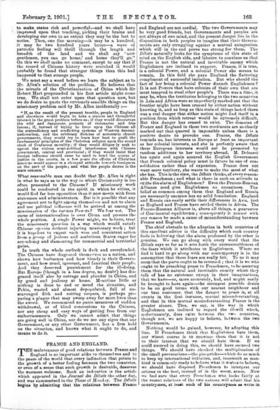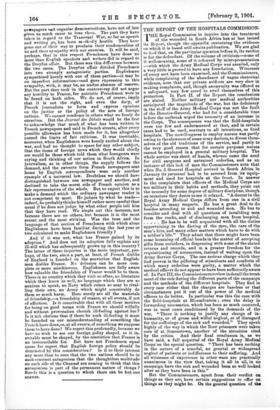FRANCE AND ENGLAND.
THE maintenance of good relations between France and England is so important alike to themselves and to the peace of the world that every indication that points to the growth of a better feeling between the two countries, or even of a sense that such growth is desirable, deserves the warmest welcome. Such an indication is the article which appeared in the Journal des Dads the other day, and was summarised in the Times of Monday. The Dibals begins by admitting that the relations between France and England are not cordial. The two Governments may be very good friends, but Governments and peoples are not always of one mind, and the present danger lies in the disposition in both peoples to imagine that their Govern- ments are only struggling against a mutual antagonism which will in the end prove the strong for them. The Debats naturally looks for the symptoms of this state of mind on the English side, and labours to convince us that France is not the natural and inevitable enemy which Englishmen are inclined to suppose. France, it is true, is a colonial Power, and a colonial Power she means to remain. In this field she pays England the flattering compliment of successful imitation. But why should the fact of her being a colonial Power disturb Englishmen ? It is not Powers that have colonies of their own that are most tempted to steal other people's. There was a time, it may be, when the territories belonging to the two countries in Asia and Africa were so imperfectly marked out that the frontier might have been crossed by either nation without knowing it, and so long as this state of things lasted there was a real danger that either nation might find itself in a position from which retreat would be extremely difficult. But this danger has ceased to exist. The domains of France and England in these two continents are so clearly marked out that quarrel is impossible unless there is a positive desire to provoke one. France, the Debats reminds us, has interests in Europe at least as important as her colonial interests, and she is perfectly aware that these European interests would not be promoted by random additions to her territory abroad. M. Delcasse has again and again assured the English Government that French colonial policy must in future be one of con- solidation rather than of expansion. France does not want more territory, she wants to make the most of what she has. This is the view, the Debate thinks, of every reason- able Frenchman ; and what is there in such an attitude to excite the alarm of Englishmen? Even the Franco-Russian Alliance need give Englishmen no uneasiness. The belief so common among them that England and Russia are necessarily enemies has no solid foundation. England and Russia can easily settle their differences in Asia, just as England and France have settled theirs in Africa. The Franco-Russian Alliance is, above all things, a, guarantee of Continental equilibrium ; consequently it cannot with any reason be made a cause of misunderstanding between France and England.
The chief obstacle to the adoption in both countries of this excellent advice is the difficulty which each country feels in believing that the alarm professed by the other is genuine. We can go along with every word that the Debate says so far as it sets forth the unreasonableness of the fears which it attributes to Englishmen. Where we find it hard to go along with our contemporary is in the assumption that these fears are really felt. To us it may seem that the parts ought to be reversed ; that it is we who ought to be preaching peace to Frenchmen, to be assuring them that the natural and inevitable enmity which they talk of has no existence except in their imaginations, that we have—or, more accurately, had, and might easily
be brought to have again—the strongest possible desire to be on good terms with our nearest neighbour and our best customer, that the danger to peace is, at all events in the first instance, mutual misunderstanding, and that in this mutual misunderstanding France is the greater sinner. This, we say, is the way in which
Englishmen are inclined to regard the which, unfortunately, does exist between the two countries, though not, we are happy to believe, between the two Governments.
Nothing would be gained, however, by adopting this line. If Frenchmen think that Englishmen hate them, our wisest course is to convince them that it is not to their interest that we should hate them. If we could succeed in doing this, we should have secured two things. We should have checked the multiplication of the small provocations—the pin-pricks—which do so much to keep up international irritation, and, inasmuch as man- kind is commonly ready to believe what it wishes to believe, we should have disposed Fn-nch men to interpret our actions in the best, instead of in the worst, sense. Now
we feel sure that every Frenchman who looks fairly at the recent relations of the two nations will admit that his countrymen, at least such of his countrymen as write in newspapers ..sid organise demonstrations, have not of late given us much cause to love them. The part they have taken in regard to the Transvaal War, so far as speech and writing go, has been markedly hostile. They have gone out of their way to proclaim their condemnation of us and their sympathy with our enemies. It will be said, perhaps, that in this respect Frenchmen have done no more than English speakers and writers did in regard to the Dreyfus affair. But there was this difference between the two cases. The Dreyfus affair divided Frenchmen into two strongly antagonistic parties. Englishmen sympathised keenly with one of these parties—it may be on imperfect information—and gave expression to this sympathy, with, it may be, an undue absence of reserve. But the part they took in the controversy did not argue any hostility to France, for patriotic Frenchmen were to be found on both sides. We do not, of course, imply that it is not the right, and even the duty, of French journalists to form and express opinions on the justice or the policy of the acts of foreign nations. We cannot condemn in others what we freely do ourselves. But the Journal des Debats would be the first to acknowledge that much of what has been written in French newspapers and said in French streets, after every possible allowance has been made for it, has altogether passed the limits of fair criticism. It was inevitable, moreover, when Englishmen were keenly excited about the war, and had no thought to spare for any other subject, that the items of foreign news which they would chiefly see would be those which told them what foreigners were saying and thinking of our action in South Africa. In journalism, as in other things, the supply follows the demand, and the extracts from French newspapers sent home by English correspondents were only another example of a universal law. Doubtless we should have distinguished between one newspaper and another, and declined to take the worst side of French opinion as a fair representative of the whole. But to expect this is to make a demand which the ordinary newspaper reader is not competent to meet. He judges by what he reads— indeed, he probably thinks himself rather more careful than usual if he does not judge by what other people tell him that they have read. We single out this instance, not because there are no others, but because it is the most recent and the most striking. Was the tone and the language of that section of Frenchmen with which alone Englishmen have been familiar during the last year or two calculated to make Englishmen friendly ?
And if it was not, what has France gained by its adoption ? And does not its adoption fully explain any ill-will which has subsequently grown up in this country ? The latter of these inquiries is the more important, per- haps, of the two, since a part, at least, of French dislike of England is founded on the conviction that English- men dislike France. No delusion can be more com- plete or more mischievous. Englishmen are fully aware bow valuable the friendship of France would be to them. There is no country which they visit so often, no literature which they know so well, no language which they are so anxious to speak, no Navy which comes so near to rival- ling their own, no Army which might conceivably do them so much harm. Here surely are all the materials of friendship,—a friendship of reason, at all events, if not of affection. Is it conceivable that with all these motives for being on good terms with France we should wilfully and without provocation cherish ill-feeling against her ? Is it nct obvious that if there be such ill-feeling it must be founded on our misunderstanding of something the French have done,or, at all events, of something we suppose them to have done? We regret. this profoundly, because we have no wish to see our foreign policy shaped, as it in- evitably must be shaped, by the conviction that France is an irreconcilable foe. But have not Frenchmen equal cause for regret that English foreign policy should be dominated by this consideration ? Is it to their interest any more than to ours that the two nations should he in such constant antagonism that the thoughtless multitude on each side of the Channel are coming to think that this antagonism is part of the permanent nature of things ? Surely this is a question to which there can be but one answer.



































 Previous page
Previous page